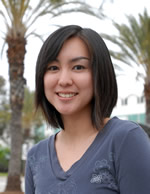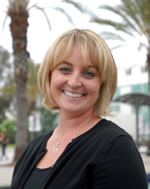Welcome to Cal State Fullerton Commencement highlights, featuring members of the Class of 2008. The following is a news release prepared in advance of the May 17-18 ceremonies.
Graduating Senior, Grad Student Honored
Motozuka, McCook Recognized With Alumni Association Awards
Hiromi Motozuka came to Cal State Fullerton five years ago to study intercultural communications and authored a training manual to help other Japanese immigrants deal with cultural shock. After a two-year hiatus, Melanie McCook returned to college to serve others, particularly the elderly.
For their scholastic achievements and service to community, both women are among the top honorees at Cal State Fullerton's commencement celebration.
Motozuka is the Class of 2008 recipient of the CSUF Alumni Association Outstanding Graduate Student Award, and McCook, the Alumni Association's Outstanding Senior Award. Both awards will be presented during the university's May 16 Honors Convocation, on the eve of commencement.

Hiromi Motozuka
Motozuka
"My undergraduate degree was really broad, and I was looking for more specific study," explains Motozuka, who holds a bachelor's degree in international relations from Nihon University in Japan. One of her instructors in Japan suggested she go to Cal State Fullerton to study.
She took classes from two well-known intercultural communication authorities: the late Bill Gudykunst and Stella Ting-Toomey, professor of human communication studies and the university's 2007-08 Outstanding Professor Award recipient.
"In all three of my intercultural seminars, Ms. Motozuka demonstrated hard work, dedication and a strong commitment in mastering complex intercultural communication theories, research and practice," said Ting-Toomey, who served as Motozuka's graduate adviser. "Her papers were consistently well-researched and well-conceptualized. In each seminar, she significantly improved in her research skills and scholarship."
As her graduate project, Motozuka focused on the intercultural adjustments faced by the spouses of Japanese expatriates in the United States.
"I discovered that my cousin's wife was having trouble adjusting to the culture here," Motozuka explained. Although several studies had been done with the focus on the expatriate who chooses to live in another country, she decided to focus on the spouses, who may not have been a part of the decision to leave their native country.
"I want to help them, so I developed a training manual and held individuals sessions with these spouses," said Motozuka. "I was trying to let them know what strategies and skills that they could use that would help them feel more comfortable in their relationships in this country."
Motozuka knew from her own experience what the spouses were feeling. "I shared how I was able to adjust to my new surroundings and that I'm still practicing," she admits with a smile. "I wanted to let them know that they can behave differently in separate surroundings" and feel more comfortable doing so.
Motozuka said she felt more comfortable at Cal State Fullerton because of the support she received from Ting-Toomey, other faculty and staff members. "I was not afraid of trying new things because I knew someone would always be there to support me," the Pomona resident said. "I always say that I am the luckiest student to have had Stella as my adviser."
Her 117-page graduate project, "Intercultural Adjustment Training for Japanese Expatriate Spouses in the United States" was "well-designed, theoretically persuasive and filled with new insights and original training activities," said Ting-Toomey. "In her oral defense, she was able to answer each applied project question with confidence and poise. She is one of the rare graduate students who progressed in an accelerated learning pace and took constructive feedback seriously."
The project has been submitted for presentation consideration at the National Communication Association Conference set for November in San Diego .
In addition to her research endeavors, Motozuka has been involved in a wide range of professional and volunteer activities, from working as a Japanese language coach at Esperanza High School and an instructional assistant in human communication studies courses at Cal State Fullerton, to serving as a volunteer international peer in Cal State Fullerton's International Education and Exchange Office, a student assistant in the university's Speech and Hearing Clinic and an intern for the nonprofit Summer Institute for Intercultural Communication in Portland.

Melanie McCook
McCook
McCook credits her mother, Jerri Freeman, and her grandmother for the career path she ultimately chose, after venturing out on her own. At 19, she became a flight attendant.
"It was a great experience," McCook said of the four-year career. "I grew up a lot, met lots of new people. . It was what helped me decide to go back to school and settle on a major. It helped me find my niche."
Her choice of human services as a major came from her mother's work. Freeman, who is on staff at the Women's Center/Adult Re-entry Center has taught domestic violence training and volunteered with the Women's Transitional Living Center. Still, McCook says, her 80-year-old grandmother - "a ball of energy" - was the biggest influence when she decided to focus on gerontology.
"She is really what we all strive to be at that age," said McCook, noting that her grandmother leads mall walks for seniors and teaches wheelchair exercise classes.
That was one of the reasons that she signed up to a part of WECARE, an Americorps program that works to educate seniors on issues that affect them. Cal State Fullerton instituted the program earlier this year.
"It's been fantastic," says McCook, who hopes to become a director of a program for seniors and, perhaps, teach after completing graduate school. "I did an internship on the administrative side of WECARE and saw what it takes to get a program going. The experience has been invaluable."
In addition to WECARE, McCook has been a member of the Human Services Student Association and an organizer of a recent "Personal Care" donation drive in which the group collected such items as toothbrushes, toothpaste, shampoo and soap that were donated to a shelter for battered women.
McCook has worked with the university's Gender Alliance Program, which educates incoming freshmen about sexual assault and the importance of communication between the sexes, and volunteered with the Women's Center on such special events as the Domestic Violence Conference.
"She is a ball of fire!" said Susan Leavy, who oversees the Gender Alliance Program. "Enthusiasm, emotional connection to her audience and verbal competence brought vibrancy to every one of the presentations in which she participated. Melanie is light and electricity, directed with keen intellect. Students who were in a presentation facilitated by Melanie were drawn in by her warmth and integrity. Melanie gives without regret or expectation of recompense."
Off campus, McCook is a volunteer with the Alzheimer's Association and hopes to complete 450 hours of service with the organization by November. She has worked with an organization called "Pack for the Future," a nonprofit that provides backpacks filled with school supplies to children who live on military bases, and served as a volunteer with the Beckstrand Cancer Foundation.
"Melanie has a zest for life, and she really engages in everything I give her," said Deborah O'Connor of the Alzheimer's Association. "Everything she does for the association, she puts her heart and soul into it."
"Melanie is an outstanding student. Her enthusiasm and tenacity give her a powerful presence," said Charles Royston, lecturer in human services. "She is a natural leader with strong commitments to serve."
In addition to the Alumni Association award, McCook was recently honored with the Center for Internships and Service Learning Extraordinary Acts of Service Award.
Photos: Available online at www.fullerton.edu/newsphotos
Media Contacts:
Pamela McLaren, Public Affairs , 657-278-4852 or pmclaren@fullerton.edu
